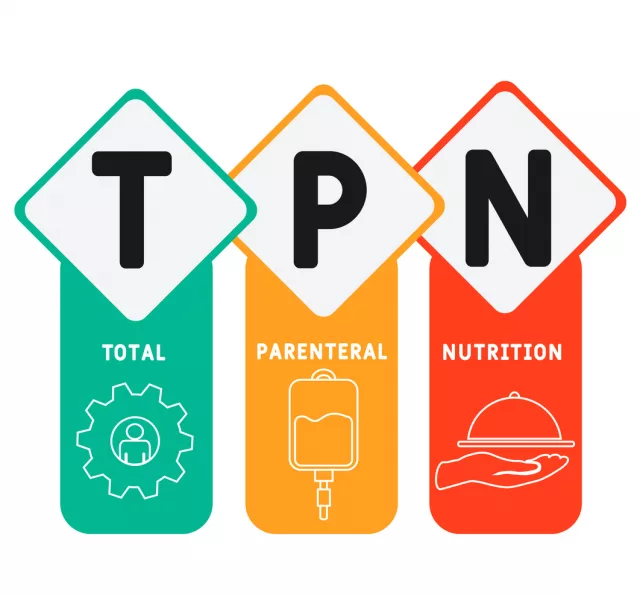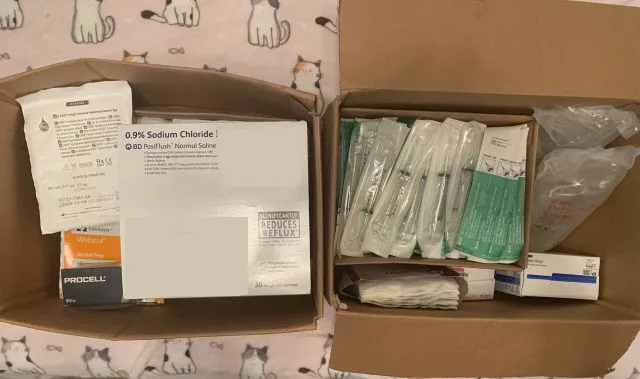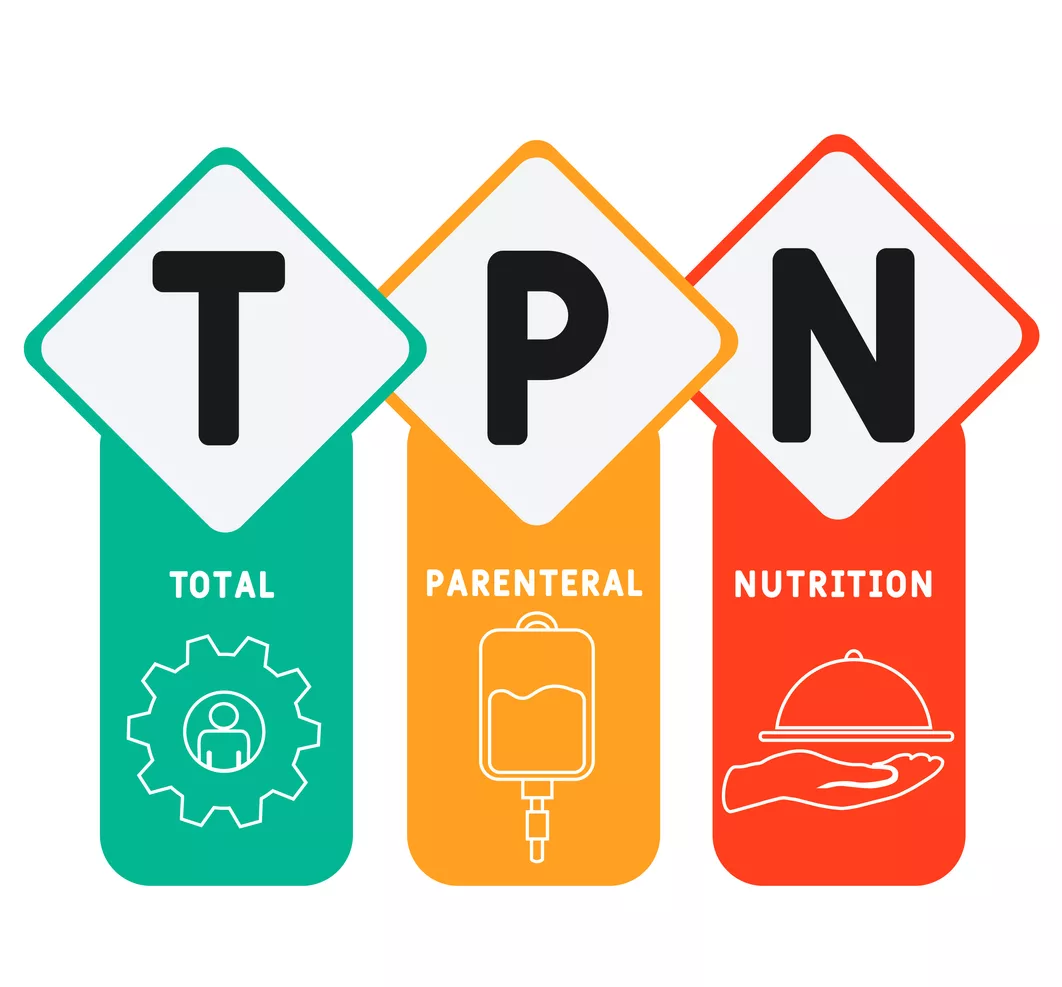
The board-certified pharmacists, dietitians, and nurses at Nutrishare have specialized in home TPN for more than 30 years. As the only TPN pharmacy in the US focusing exclusively on home TPN for adults and children needing long-term support, our knowledge, expertise, and experience is unmatched nationally.
Learning about TPN at the home and how it works is the best way to help alleviate anxiety about your treatment. In this post, we’ll explain what TPN is, how it works, and why it’s essential to have a reliable home TPN provider you can trust for clinical support.
What Is Parenteral Nutrition / Parenteral Feeding?
Developed in the 1960s, by Dr. Stanley Dudrick and colleagues1,2, parenteral nutrition (PN) involves directly administering nutrition through the bloodstream, rather than the intestinal tract, for people diagnosed with conditions such as short bowel syndrome, high output fistulas, intestinal dysmotility, and bowel obstructions3. If you have these medical conditions, your digestive system can’t absorb all the nutrients from food to keep you properly nourished. To prevent malnutrition, you may need an alternative form of nutrition—PN—that bypasses your gastrointestinal tract. When you need PN to provide all your daily nutritional needs, the therapy is often called total parenteral nutrition (TPN). When the need for PN extends past the hospital and into the home, it is then sometimes referred to as Home Parenteral Nutrition.4, 5
How Does PN Work?
There are two types of parenteral nutrition—Central Parenteral Nutrition and Peripheral Parenteral Nutrition.
Central Parenteral Nutrition (CPN):6, 7, 8 CPN is infused through a catheter called a central line. A central line is also referred to as a central venous access device (CVAD) or central venous catheter (CVC). A physician inserts the catheter in one of the large veins of the body that leads to the heart.
There are several types of CVCs that can be used for CPN. One option for patients needing CPN for a prolonged period of time is a venous access port. The port is a device (reservoir) implanted under the chest skin. The reservoir has a catheter that is then inserted into a central vein.9
A tunneled CVC is another device that is considered for patients needing long-term CPN. Unlike a port that’s completely under the skin, a tunneled CVC is partially under the skin, with a part the extends outside of the body. Peripherally inserted central catheter (PICC) is also used for CPN infusion. PICC is a long catheter that is usually placed in the arm.10 Physicians take multiple factors into consideration when deciding which type of CVC to use, but ultimately the goal is having CPN safely infuse in a line that will last long and promote a good quality of life.
Peripheral parenteral nutrition (PPN):6, 7, 11 PPN is administered via a catheter that is inserted into a peripheral vein located either under the skin or under the muscle. Peripheral intravenous catheters (PIVCs) come in various lengths and usually can stay in place from 4 to 14 days.12 Peripheral access is not ideal for parenteral nutrition because it limits the nutrients that can be provided and doesn’t have a central line’s longevity. PPN is generally limited to those patients who will require PN for less than 2 weeks.13
The Benefits of Home TPN
Home TPN, also known as Home Parenteral Nutrition, empowers about 40,000 people in the US to safely and effectively receive TPN in the comfort of home. It’s important to remember that relying on TPN doesn’t mean you can’t enjoy a satisfying quality of life14 that includes school, work, travel15, and pursuing other interests. It might be helpful to focus on these positive aspects of TPN:
- TPN is a life sustaining therapy that delivers essential nutrition and helps treat various diseases or conditions.
- By staving off malnutrition, TPN enables patients to thrive with a newfound quality of life.
- Many TPN consumers are still social eaters! A dietitian and medical team determine the amount of food a TPN patient can consume and any dietary restrictions.
Advances in TPN technology allow patients to continue living fulfilling lives and doing what they did before needing TPN.
Home TPN Supplies & Equipment
Safely and effectively administering TPN in a home setting involves several pieces of equipment:
- A central line, placed under the supervision of your physician
- Bagged home TPN formula, shipped to your house by your home TPN provider and stored in a refrigerator
- A TPN pump designed to administer TPN formula through the central line, along with a backpack, IV pole or hook
- A TPN solution administration set
- Syringes, alcohol wipes, and a sterile barrier
It’s critical to keep TPN supplies and equipment clean. Keeping the central line clean is especially important to prevent bloodstream infections16 and to ensure you are comfortable during the TPN infusion. It typically takes about 10 to 12 hours to administer a day’s worth of TPN formula, but the length of time can vary depending on your individual nutrition needs. Many patients infuse overnight so they have the flexibility during the day to work, pursue leisure activities, or attend physician appointments. You can personalize infusion schedules to fit your lifestyles and needs.5, 17
Technological advancements in pumps and formula storage have made home TPN far less burdensome and disruptive to your life than in the past. For example, you can carry portable pumps in a backpack and administer HPN on the go without needing an IV pole or hook.
What’s in a TPN bag?

Generally, a TPN bag will consist of a prepared solution with added components to more precisely adjust the proportions to suit an individual patient’s unique needs.
There are commercially prepared parenteral nutrition products, however the vast majority of patients using PN at home will be on a custom formula that meets the consumer’s unique needs.18 The parenteral nutrition formula should consider the patient’s age, gender, nutritional requirements, underlying diagnosis, and other factors. A doctor, typically a gastroenterologist or surgeon, works with a regulated compounding pharmacy to create an appropriate blend for a particular patient. Some clinics may have a Nutrition Support Team (NST) that will order HPN. A registered dietitian, registered nurse, pharmacist, and physician comprise the NST. The Nutrishare clinician becomes a part of this team once we onboard a patient for services.
3 Main TPN Components
The 3 main macronutrients in TPN are injectable lipid emulsions (ILEs), proteins, and dextrose.20
- Lipid emulsionsin TPN provide calories and prevent deficiency of fatty acids. Generally, 25-30% of the total calories you receive on TPN come from lipids.21
- Amino Acids (Protein)in TPN provide essential and non-essential amino acids for the body. A healthy adult requires 0.8 to 1 gm of protein per kilogram daily, though this figure varies depending on one’s condition.22
- Dextrosemonohydrates in TPN provide the carbohydrates your body needs.20
Traveling With TPN
Being prescribed home TPN doesn’t mean you’re stuck at home. Home TPN consumers can still have active lives. For example, traveling with home TPN, whether for your career or family gatherings and vacations, is still doable for TPN patients—it just requires more planning with the help and advisory support of your doctor or medical team and your TPN pharmacy.15
Choose Nutrishare for Unmatched Credentials & Support
Nutrishare is the only pharmacy in the US specializing in parenteral nutrition for the long-term consumer. We ship to every state in the nation and can arrange to provide TPN for international trips. Our clinical staff has made a career-long focus on how to best care for patients who require parenteral nutrition, and we are dedicated to putting patient choice first in our support.
Nutrishare earned the Distinction in Nutrition Support (NTS) from The Accreditation Commission for Health Care (ACHC), an independent agency recognized as the gold standard in health care accreditation. ACHC is recognized by the Centers for Medicare & Medicaid Services (CMS) as a national accreditor for home infusion therapy suppliers. This means their surveys meet or exceed Medicare requirements.
How Much Does TPN at Home Cost?
Home TPN costs quickly add up. Most primary and secondary insurance plans cover the cost of home TPN when a physician prescribes it. Insurance plans differ, but our team of specialists is here to help determine your coverage with an insurance pre-check and explore ways to make home TPN affordable for your family.
Our insurance experts are ready to help you get started with Nutrishare. Begin by submitting an insurance pre-check. A member of our team will contact you. Or call us at 1-800-HOME-TPN (466-3876).
1 Vanek, V. W. (2008). A.S.P.E.N.—Past, Present, and Future. Journal of Parenteral and Enteral Nutrition, 32(5), 535–562. https://doi.org/10.1177/0148607108321711
2 Hurt, R. T., & Steiger, E. (2018). Early History of Home Parenteral Nutrition: From Hospital to Home. Nutrition in Clinical Practice, 33(5), 598–613. https://doi.org/10.1002/ncp.10180
3 Worthington, P., Balint, J., Bechtold, M., Bingham, A., Chan, L.-N., Durfee, S., Jevenn, A. K., Malone, A., Mascarenhas, M., Robinson, D. T., & Holcombe, B. (2017). When Is Parenteral Nutrition Appropriate? Journal of Parenteral and Enteral Nutrition, 41(3), 324–377. https://doi.org/10.1177/0148607117695251
4 Bering, J., & DiBaise, J. K. (2022). Home Parenteral and Enteral Nutrition. Nutrients, 14(13), 2558. https://doi.org/10.3390/nu14132558
5 Mueller, C. M., & American Society of Parenteral and Enteral Nutrition (Eds.). (2012). Home Nutrition Support. In The A.S.P.E.N. Adult Nutrition Support Core Curriculum (2. ed). A.S.P.E.N.
6 Schwartz, L. K., Cusson, G., & Semrad, C. (2009). Parenteral nutrition 101: A user’s guide. Gastrointestinal Endoscopy, 69(7), 1351–1353. https://doi.org/10.1016/j.gie.2009.03.1166
7 Mueller, C. M., & American Society of Parenteral and Enteral Nutrition (Eds.). (2012). Overview of Parenteral Nutrition. In The A.S.P.E.N. Adult Nutrition Support Core Curriculum (2. ed). A.S.P.E.N.
8 Mueller, C. M., & American Society of Parenteral and Enteral Nutrition (Eds.). (2012). Parenteral Access Devices. In The A.S.P.E.N. Adult Nutrition Support Core Curriculum (2. ed). A.S.P.E.N.
9 Port-A-Cath 101: How To Access The Port. (n.d.). Nurse.Org. Retrieved December 21, 2023, from https://nurse.org/articles/what-is-a-port-a-cath/
10 Kovacevich DS, Corrigan M, Ross VM, McKeever L, Hall AM, Braunschweig C. American Society for Parenteral and Enteral Nutrition Guidelines for the Selection and Care of Central Venous Access Devices for Adult Home Parenteral Nutrition Administration. JPEN J Parenter Enteral Nutr. 2019 Jan;43(1):15-31. doi: 10.1002/jpen.1455. Epub 2018 Oct 19. PMID: 30339287.
11 Schwartz, L. K., Cusson, G., & Semrad, C. (2009). Parenteral nutrition 101: A user’s guide. Gastrointestinal Endoscopy, 69(7), 1351–1353. https://doi.org/10.1016/j.gie.2009.03.1166
12 Gorski LA, Hadaway L, Hagle ME, Broadhurst D, Clare S, Kleidon T, Meyer BM, Nickel B, Rowley S, Sharpe E, Alexander M. Infusion Therapy Standards of Practice, 8th Edition. J Infus Nurs. 2021 Jan-Feb 01;44(1S Suppl 1):S1-S224. doi: 10.1097/NAN.0000000000000396. PMID: 33394637.
13 Ayers, P., Holcombe, B., Plogsted, S., & Guenter, P. (2014). Overview of Parenteral Nutrition. In ASPEN Parenteral Nutrition Handbook (2nd ed., pp. 28–29). A.S.P.E.N.
14 Winkler, M. F., Hagan, E., Wetle, T., Smith, C., Maillet, J. O., & Touger-Decker, R. (2010). An Exploration of Quality of Life and the Experience of Living With Home Parenteral Nutrition. Journal of Parenteral and Enteral Nutrition, 34(4), 395–407. https://doi.org/10.1177/0148607110362582
15 Patsy, A., Panciu, A., & Senussi, N. (2017). Have PN (Parenteral Nutrition) – Will Travel. Practical Gastroenterology.
16 Cabrero, E. L., Robledo, R. T., Cuñado, A. C., Sardelli, D. G., López, C. H., Formatger, D. G., Perez, L. L., López, C. E., & Moreno, A. T. (2023). Risk factors of catheter- associated bloodstream infection: Systematic review and meta-analysis. PLOS ONE, 18(3), e0282290. https://doi.org/10.1371/journal.pone.0282290
17 Winkler, M. F., & Smith, C. E. (2015). The Impact of Long-Term Home Parenteral Nutrition on the Patient and the Family: Achieving Normalcy in Life. Journal of Infusion Nursing, 38(4), 290. https://doi.org/10.1097/NAN.0000000000000112
18 Mueller, C. M., & American Society of Parenteral and Enteral Nutrition (Eds.). (2012). Parenteral Nutrition Formulations. In The A.S.P.E.N. Adult Nutrition Support Core Curriculum (2. ed). A.S.P.E.N.
19 Schneider, P. J. (2006). Nutrition Support Teams: An Evidence-Based Practice. Nutrition in Clinical Practice, 21(1), 62–67. https://doi.org/10.1177/011542650602100162
20 Mueller, C. M., & American Society of Parenteral and Enteral Nutrition (Eds.). (2012). Parenteral Nutrition Formulations. In The A.S.P.E.N. Adult Nutrition Support Core Curriculum (2. ed). A.S.P.E.N.
21 Mueller, C. M., & American Society of Parenteral and Enteral Nutrition (Eds.). (2012). Lipids. In The A.S.P.E.N. Adult Nutrition Support Core Curriculum (2. ed). A.S.P.E.N.
22 Mueller, C. M., & American Society of Parenteral and Enteral Nutrition (Eds.). (2012). Protein. In The A.S.P.E.N. Adult Nutrition Support Core Curriculum (2. ed). A.S.P.E.N.

